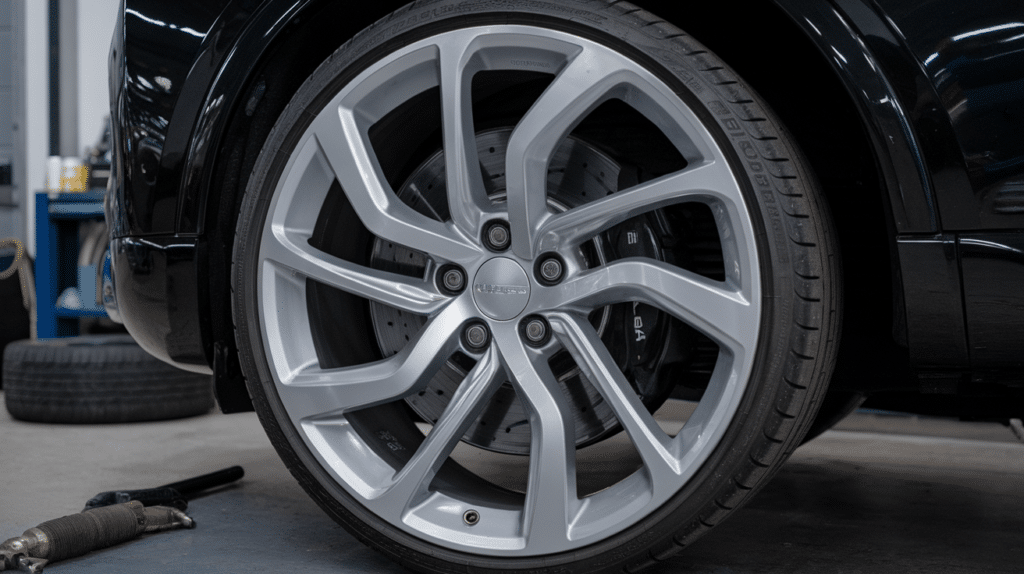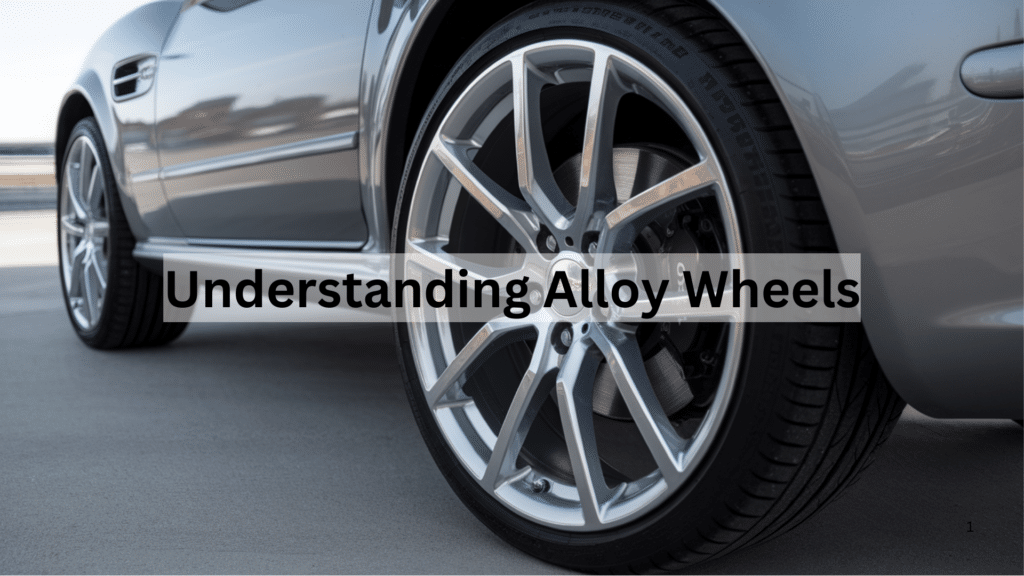Are you confused about alloy wheels? You are not alone. I was once just as puzzled.
In this article, I’ll explain exactly what alloy wheels are and why they matter for your car. You’ll learn about their types, benefits, and how to choose the perfect set.
I promise to solve your wheel confusion with clear, straightforward advice. There will be no technical jargon—just helpful information you can use today.
As a car enthusiast who’s tested dozens of wheel types over 15 years, I know the real differences between hype and performance. My experience saves you time and money.
Understanding alloy wheels is the first step in improving your car’s performance, boosting its looks, or increasing its value.
Let’s cut through the confusion and get you rolling on the right wheels!
What Exactly Are Alloy Wheels?

Alloy wheels are not just regular wheels. They’re special wheels made from a mix of metals—mainly aluminum with other metals like magnesium or nickel.
Unlike old-school steel wheels, alloy wheels offer a perfect blend of strength and style. They first appeared on fancy race cars in the 1960s, and now they’re everywhere!
You might wonder: why all the fuss about wheel material? Trust me, it matters more than you think.
The Science Behind Alloy Wheels
Making alloy wheels is pretty cool. Factories either pour molten metal into molds (casting) or stamp and forge them under huge pressure.
Different metal mixes create different benefits:
- Aluminum makes them light
- Magnesium adds extra strength
- Nickel helps fight rust
The best part? Alloy wheels can be up to 30% lighter than steel ones while staying just as strong.
Types of Alloy Wheels
Alloy wheels come in different types, each offering a mix of strength, style, and performance. Some are built for durability, while others focus on a lightweight design for better speed and handling. Knowing the different types can help you pick the right wheels for your car.
Here are the main types:
| Type | Manufacturing Process | Strength | Weight | Cost | Best For | Durability |
|---|---|---|---|---|---|---|
| Cast Alloy | Molten metal poured into molds | Good | Heavier (7-9 kg) | $100-300 per wheel | Daily driving, Budget-conscious drivers | 5-7 years with proper care |
| Forged Alloy | Metal pressed under high pressure | Excellent | Lightest (4-7 kg) | $300-1000+ per wheel | Performance driving, Racing, Luxury vehicles | 7-10+ years with proper care |
| Flow-Formed | Cast face with barrel that’s spun and formed | Very Good | Medium (6-8 kg) | $200-500 per wheel | Enthusiasts, Performance on a budget | 6-8 years with proper care |
| Multi-Piece | Separate pieces (center, barrel, lip) bolted together | Good to Excellent | Varies (7-10 kg) | $500-2000+ per wheel | Customization, Show cars, Stance builds | 7-10 years, parts can be replaced |
| Gravity Cast | Enhanced casting with pressure | Good to Very Good | Medium (7-8 kg) | $150-350 per wheel | Upgraded daily drivers | 6-8 years with proper care |
Each type has its own fans. Race car drivers love forged wheels, while budget-conscious drivers usually choose cast ones.
Performance Benefits of Alloy Wheels
Alloy wheels aren’t just about looks—they can boost your car’s performance too. They are lighter than steel wheels, which helps with better handling and fuel efficiency. Plus, they improve braking and reduce strain on suspension for a smoother ride.
Improved Handling and Performance
Alloy wheels are 20-30% lighter than steel wheels. This reduces unsprung weight, making your car more responsive when turning and braking.
Better Brake Cooling
The metal in alloy wheels conducts heat better than steel. This helps your brakes stay cooler during hard driving and prevents brake fade on long downhills.
Increased Fuel Efficiency
Lighter wheels mean your engine doesn’t have to work as hard. Many drivers see a 1-2% improvement in gas mileage after switching to quality alloy wheels.
Enhanced Vehicle Appearance
The clean, modern look of alloy wheels instantly upgrades your car’s appearance. They’re available in countless designs to match your personal style.
Higher Resale Value
Cars with alloy wheels typically sell faster and for more money. This investment pays off when it’s time to sell your vehicle.
Your whole car feels different with alloy wheels. The ride is smoother. The steering feels more direct.
Why Alloy Wheels Transform a Vehicle’s Look
Alloy wheels can instantly change a vehicle’s appearance, giving it a sleek and modern touch. Their stylish designs and polished finishes make any car stand out on the road.
Plus, they’re lighter than steel wheels, which can improve handling and performance. I’ve seen boring cars become head-turners just by switching to the right alloy wheels.
Alloy wheels can be shaped in ways steel wheels can’t. This means more cool designs!
They come in so many finishes:
- Shiny polished
- Sleek painted
- Two-tone machined
- Flashy chrome
The right wheels can make your car look more expensive. When selling your car, nice alloy wheels can help you get more money for it!
Maintenance and Care
Alloy wheels add style and performance to your car but need proper care to stay in top shape. Regular cleaning, protection from corrosion, and careful driving help maintain their look and durability.
With the right maintenance, your alloy wheels can last longer and keep your vehicle looking great. Taking care of alloy wheels isn’t hard, but it’s important.
Regular Cleaning
Wash your alloy wheels every 1-2 weeks with pH-neutral soap and water. Avoid harsh chemicals that can damage the finish. Clean in the shade when the wheels are cool to the touch.
Apply Protective Sealant
Use a wheel-specific sealant every 3-4 months. This creates a barrier against brake dust, road grime, and corrosive substances like road salt.
Inspect for Damage
Check your wheels monthly for scratches, cracks, or bent areas. If not addressed early, small issues can grow into bigger problems.
Proper Tire Pressure
Maintain correct tire pressure according to your vehicle’s manual. Underinflated tires put extra stress on your alloy wheels and can cause damage.
Professional Cleaning Twice Yearly
Get a professional deep clean and inspection twice a year. Professionals can reach areas you might miss and spot potential problems early.
Winter brings salt and grime. Clean your wheels more often during cold months.
Got a scratch? Minor damage can often be fixed. Deep cracks need professional help.
Buying Guide – What to Consider
Ready to get some alloy wheels? Here’s what to think about:
Size matters. Make sure you get the right size for your car. Too big or too small causes problems.
Check the load rating. This tells you how much weight the wheel can handle.
Good alloy wheels aren’t cheap. But the cheapest ones aren’t worth it either. Find the middle ground.
Should you get wheels from your car maker or aftermarket brands? Both can be good. Car maker wheels fit perfectly but cost more.
Common Myths and Misconceptions
Let me clear up some confusion about alloy wheels.
- Myth: Alloy wheels break easily.
- Truth: Quality alloy wheels are very strong. They can bend rather than break in serious impacts, which is safer.
- Myth: You can’t use alloy wheels in winter.
- Truth: You absolutely can! Just take normal winter precautions.
- Myth: All alloy wheels improve performance.
- Truth: Quality and weight matter. Not all alloy wheels are performance-enhancing.
- Myth: More expensive always means better.
- Truth: You often pay for brand or design, not always better quality.
Conclusion
Now you know the full story about alloy wheels. They’re not just pretty accessories—they’re smart upgrades that can transform your driving experience.
The benefits are clear:
- Lighter weight improves handling and fuel economy
- Better heat dissipation protects your brakes
- Stylish designs boost your car’s appearance
- Strong construction offers peace of mind
Your perfect wheels depend on your needs. Daily commuter? Basic alloys will serve you well. Weekend racer? Consider forged alloys for maximum performance.
Remember: quality matters more than flash. Choose wheels that match your driving style and budget.
I hope this guide helps you make a confident decision. The right alloy wheels aren’t just an expense but an investment in your vehicle’s performance, appearance, and value.
Ready to roll?
Frequently Asked Questions
Are Alloy Wheels Worth the Extra Money?
Yes, alloy wheels are worth it for most drivers. They improve handling, look better than steel wheels, and can increase your car’s value when you sell it.
Can I Put Alloy Wheels on Any Car?
You can put alloy wheels on most cars but need the right size and bolt pattern. Check your car’s manual or ask a wheel specialist before buying.
Do Alloy Wheels Rust?
Alloy wheels don’t rust like steel wheels, but they can corrode. Regular cleaning and using wheel sealant twice a year will keep them looking new.
Are Alloy Wheels Less Durable than Steel Wheels?
Quality alloy wheels are very durable but may bend instead of dent. This is safer as steel wheels can crack when severely damaged.
Can I Drive on Alloy Wheels in Winter?
Yes, you can use alloy wheels year-round, including winter. Clean them more often in winter to remove road salt that might cause corrosion.

